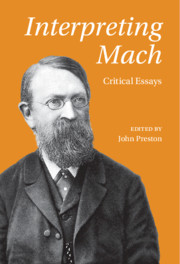Book contents
- Interpreting Mach
- Interpreting Mach
- Copyright page
- Dedication
- Contents
- Figures
- Tables
- Contributors
- Introduction
- 1 Ernst Mach’s Piano and the Making of a Psychophysical Imaginarium
- 2 Mother’s Milk and More
- 3 Meaningful Work
- 4 Mach on Analogy in Science
- 5 Ernst Mach’s Enlightenment Pragmatism
- 6 On the Philosophical and Scientific Relationship between Ernst Mach and William James
- 7 Ernst Mach and Friedrich Nietzsche
- 8 Abstraction, Pragmatism, and History in Mach’s Economy of Science
- 9 Holding the Hand of History
- 10 Ernst Mach and the Vienna Circle
- 11 Narratives Divided
- 12 Phenomenalism, or Neutral Monism, in Mach’s Analysis of Sensations?
- 13 The Case for Mach’s Neutral Monism
- Index
- References
13 - The Case for Mach’s Neutral Monism
Published online by Cambridge University Press: 05 March 2021
- Interpreting Mach
- Interpreting Mach
- Copyright page
- Dedication
- Contents
- Figures
- Tables
- Contributors
- Introduction
- 1 Ernst Mach’s Piano and the Making of a Psychophysical Imaginarium
- 2 Mother’s Milk and More
- 3 Meaningful Work
- 4 Mach on Analogy in Science
- 5 Ernst Mach’s Enlightenment Pragmatism
- 6 On the Philosophical and Scientific Relationship between Ernst Mach and William James
- 7 Ernst Mach and Friedrich Nietzsche
- 8 Abstraction, Pragmatism, and History in Mach’s Economy of Science
- 9 Holding the Hand of History
- 10 Ernst Mach and the Vienna Circle
- 11 Narratives Divided
- 12 Phenomenalism, or Neutral Monism, in Mach’s Analysis of Sensations?
- 13 The Case for Mach’s Neutral Monism
- Index
- References
Summary
Although the received view of Ernst Mach comported well with Mach’s historical influence on members of the Vienna Circle , it is inadequate, and it is now giving way to a more realistic and nuanced ‘neutral monist’ view. I defend the neutral monist tradition and show that it is actually a form of scientific realism, not positivism. I also argue that it is more in line with Mach’s contemporary reception, and that it leads to the views of American Realists, as well as to the views of our contemporary neutral monists. I start with a characterisation of some tenets of neutral monism in general, many of which were shared by William James and Bertrand Russell, both deeply influenced by Mach. I then detail the evidence for these views in Mach’s texts (including his notebooks and other documents). Seeing Mach as a kind of realist also casts much light on his scientific views and corrects a number of historical misconceptions regarding both atomism and Mach’s philosophy of space and time. Finally, I discuss Mach’s place in the neutral monist movement of James, Russell, and the American Realists, and the revival of these views in recent philosophy of mind.
- Type
- Chapter
- Information
- Interpreting MachCritical Essays, pp. 258 - 279Publisher: Cambridge University PressPrint publication year: 2021
References
- 5
- Cited by

